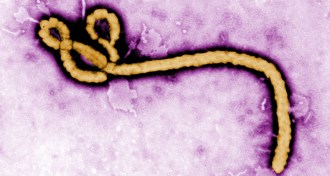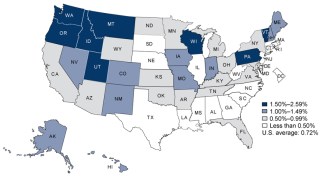Nathan Seppa
Biomedical Writer (retired September 2015)

Trustworthy journalism comes at a price.
Scientists and journalists share a core belief in questioning, observing and verifying to reach the truth. Science News reports on crucial research and discovery across science disciplines. We need your financial support to make it happen – every contribution makes a difference.
All Stories by Nathan Seppa
-
 Health & Medicine
Health & MedicineExercise seems to limit bad falls in elderly
Regular exercise might limit broken bones due to bad falls in elderly people.
-
 Health & Medicine
Health & MedicineAntibodies show progress against HIV
Proteins suppress disease in monkeys, but don’t cure it.
-
 Health & Medicine
Health & MedicineInfant digestive problem more likely with formula
Hypertrophic pyloric stenosis, which causes forceful vomiting, is more common in babies not breast-fed.
-
 Health & Medicine
Health & MedicineHopes raised for Ebola treatment
Most monkeys given dual therapy survive infection with lethal virus.
-
 Health & Medicine
Health & MedicineAudio therapy may avert chemo-induced hearing loss
Mice exposed to loud sound before getting chemotherapy preserve valuable cells in the inner ear, a new study shows.
-
 Science & Society
Science & SocietyScarcity
Sendhil Mullainathan and Eldar Shafir explain why having too little means so much.
-
 Health & Medicine
Health & MedicineHighlights from annual meeting of infectious disease specialists
Heartburn pills increase risk of pneumonia, a better catheter and more were presented October 2-6, 2013 at ID Week in San Francisco.
-
 Health & Medicine
Health & MedicineOld drug may have new trick
Parkinson’s medication helps mice with condition that mimics MS.
-
 Health & Medicine
Health & MedicineNorovirus vaccine shows early progress
Individuals immunized against Norwalk virus and another norovirus experienced less vomiting and diarrhea than those who didn't receive shots.
-
 Health & Medicine
Health & MedicineGood bacteria from poop stop resistant infection
Pills fashioned from beneficial microbes in feces overcome C. difficile infections.
-
 Health & Medicine
Health & MedicineDextrose rub helps newborns with low blood sugar
Massaging the sugary gel into babies’ mouths may lessen the need for intravenous infusions of glucose, a study shows.
-
 Health & Medicine
Health & MedicineHome births more risky than hospital deliveries
Babies born at home are more likely to lack pulse after five minutes.